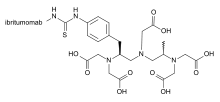Ibritumomab tiuxetan
Ibritumomab tiuxetan (pronounced /ɪbrɪtuːmoʊmæb taɪʌksɛtæn/[1]), sold under the trade name Zevalin, is a monoclonal antibody radioimmunotherapy treatment for non-Hodgkin's lymphoma. The drug uses the monoclonal mouse IgG1 antibody ibritumomab in conjunction with the chelator tiuxetan, to which a radioactive isotope (either yttrium-90 or indium-111) is added. Tiuxetan is a modified version of DTPA whose carbon backbone contains an isothiocyanatobenzyl and a methyl group.[2][3]
 | |
| Monoclonal antibody | |
|---|---|
| Type | Whole antibody |
| Source | Mouse |
| Target | CD20 |
| Clinical data | |
| Trade names | Zevalin |
| AHFS/Drugs.com | Monograph |
| License data |
|
| Routes of administration | intravenous |
| ATC code | |
| Legal status | |
| Legal status |
|
| Identifiers | |
| CAS Number | |
| DrugBank | |
| ChemSpider |
|
| UNII | |
| ChEMBL | |
| | |
Medical use
Ibritumomab is used to treat relapsed or refractory, low grade or transformed B cell non-Hodgkin's lymphoma (NHL), a lymphoproliferative disorder, and previously untreated follicular NHL in adult patients who achieve a partial or complete response to first-line chemotherapy.[4] The treatment should not be administered to patients with ≥25% lymphoma marrow involvement and/or impaired bone marrow reserve.[5]
The treatment starts with an infusions of rituximab. This may be followed by an administration of indium-111 labelled ibritumomab tiuxetan (111In replaces the 90Y component) to allow the distribution of the drug to be imaged on a gamma camera, before the actual therapy is administered. Seven to nine days later, a second infusion of rituximab is given, followed by the 90Y-ibritumomab tiuxetan, by intravenous infusion over around 10 minutes. The radioactive activity is determined based on patient body weight and platelet count.[6]
Mechanism of action
The antibody binds to the CD20 antigen found on the surface of normal and malignant B cells (but not B cell precursors), allowing radiation from the attached isotope (mostly beta emission) to kill it and some nearby cells. In addition, the antibody itself may trigger cell death via antibody-dependent cell-mediated cytotoxicity (ADCC), complement-dependent cytotoxicity (CDC), and apoptosis. Together, these actions eliminate B cells from the body, allowing a new population of healthy B cells to develop from lymphoid stem cells.[7]
History
Developed by the IDEC Pharmaceuticals, now part of Biogen Idec,[8] ibritumomab tiuxetan was the first radioimmunotherapy drug approved by the Food and Drug Administration (FDA) in 2002 to treat cancer. It was approved for the treatment of patients with relapsed or refractory, low‑grade or follicular B‑cell non‑Hodgkin's lymphoma (NHL), including patients with rituximab refractory follicular NHL.[9] It was given marketing authorisation by the European Medicines Agency in 2004 for the treatment of adult patients with rituximab relapsed or refractory CD20+ follicular B-cell non-Hodgkin's lymphoma.[10]
In September 2009, ibritumomab received approval from the FDA for an expanded label to include previously untreated patients with a chemotherapy response.[4]
Availability
Ibritumomab is currently under patent protection and not available in generic form. When first approved, it was the most expensive drug available given in a single dose, costing over US$37,000 (€30,000) for the average dose.[11][12] However, ibritumomab is essentially an entire course of lymphoma therapy which is delivered in 7–9 days, with one visit for pre-dosing Rituxan, and one visit a week later for the actual Zevalin therapeutic dose preceded by Rituxan. Compared to other monoclonal antibody treatments (many of which are well over US$40,000 for a course of therapy), it may be considered cost effective.[11][13]
See also
- Tositumomab, an alternative radioimmunotherapy treatment for non-Hodgkin's lymphoma.
External links
References
- "Ibritumomab Tiuxetan". National Cancer Institute. 26 February 2008. Retrieved 25 July 2020.
- Milenic DE, Brady ED, Brechbiel MW (June 2004). "Antibody-targeted radiation cancer therapy". Nature Reviews. Drug Discovery. 3 (6): 488–99. doi:10.1038/nrd1413. PMID 15173838.
- WHO Drug Information
- Schaefer NG, Huang P, Buchanan JW, Wahl RL (May 2011). "Radioimmunotherapy in non-Hodgkin lymphoma: opinions of nuclear medicine physicians and radiation oncologists". Journal of Nuclear Medicine. 52 (5): 830–8. doi:10.2967/jnumed.110.085589. PMC 4380183. PMID 21536931.
- "Zevalin package insert" (PDF). Acrotech Biopharma. September 2019.
- Tennvall, Jan; Fischer, Manfred; Bischof Delaloye, Angelika; Bombardieri, Emilio; Bodei, Lisa; Giammarile, Francesco; Lassmann, Michael; Oyen, Wim; Brans, Boudewijn (24 February 2007). "EANM procedure guideline for radio-immunotherapy for B-cell lymphoma with 90Y-radiolabelled ibritumomab tiuxetan (Zevalin)" (PDF). European Journal of Nuclear Medicine and Molecular Imaging. 34 (4): 616–622. doi:10.1007/s00259-007-0372-y. PMID 17323056.
- "Ibritumomab Tiuxetan" (PDF). US Food and Drug Administration.
- Pollack, Andrew (24 June 2003). "Idec to Merge With Biogen in $6.8 Billion Deal". The New York Times.
- Grillo-López AJ (October 2002). "Zevalin: the first radioimmunotherapy approved for the treatment of lymphoma". Expert Review of Anticancer Therapy. 2 (5): 485–93. doi:10.1586/14737140.2.5.485. PMID 12382517.
- "Zevalin". European Medicines Agency. 17 September 2018. Retrieved 25 July 2020.
- Cutler, Cathy S. (September 2019). "Economics of New Molecular Targeted Personalized Radiopharmaceuticals". Seminars in Nuclear Medicine. 49 (5): 450–457. doi:10.1053/j.semnuclmed.2019.07.002. PMID 31470937.
- Bazell, Robert (23 June 2004). "Why are the new cancer drugs so expensive?". Slate Magazine.
- Chen, Qiushi; Ayer, Turgay; Nastoupil, Loretta J.; Rose, Adam C.; Flowers, Christopher R. (March 2015). "Comparing the Cost-Effectiveness of Rituximab Maintenance and Radioimmunotherapy Consolidation versus Observation Following First-Line Therapy in Patients with Follicular Lymphoma". Value in Health. 18 (2): 189–197. doi:10.1016/j.jval.2014.12.017. PMC 4363091.